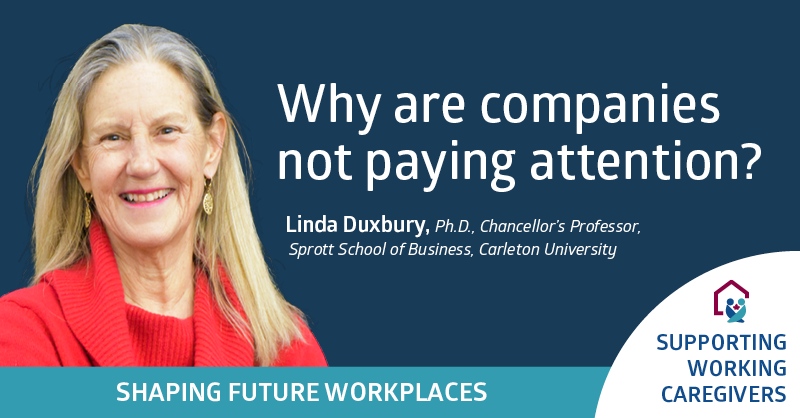Examining Motivation of Companies to Adopt Caregiver Friendly Policies
The Study on Eldercare Issues in Canadian Organizations – Summary and Key Findings undertakes to identify factors impacting the introduction of caregiver friendly workplace policies.
Demographic data from the US, Canada, and the European Union indicate that the number of employed caregivers is substantive and growing.[i] [ii] . Although the demographic data are compelling, recent research showed that 3% of employees in Canada (n=3300) indicated working for an organization with eldercare referral services; and 12% worked for an organizational that had formal policies associated with caregiving.[iii]
The Study on Eldercare Issues in Canadian Organizations – Summary and Key Findings sought to address why companies are not paying attention to issues associated with the need to balance work and caregiving. To answer this question, sixty-seven human resource executives working for sixty of Canada’s largest firms were recruited. Representation was approximately equal for private sector, public sector and greater public sector/NFP sector organizations. Every province was represented.
The approach was a modified version of the Delphi methodology[iv] [v]: solicit ideas, rate ideas, undertake final review and provide feedback.

The first round of the Delphi study involved a short interview to identify factors that would encourage or discourage their organization or other similar organizations to introduce policies and programs to support employee caregivers who are balancing work commitments with eldercare demands. Respondents identified 26 forces for change and 33 barriers.
In the second round of the Delphi study key informants answered a questionnaire developed using the responses provided in round one to refine the list of forces and barriers.
In the third round of the Delphi study, the participants were asked to examine the reduced list of drivers and barriers to change and assign a level of importance to the decision-making process in their organization, or similar organizations, to introducing programs and policies relating to eldercare and caregiving.
After completing the traditional stages associated with a Delphi study, we undertook one final step to help companies determine how to best reduce the barriers identified in phase three of the analysis.
Data from this final phase suggested the following for dealing with the key barriers to the introduction of policies and programs to address issues associated with work and eldercare:
- Organizations need to act now while ensuring a balanced approach and metrics to assess outcomes
- Practical advice on building the business case, inclusive of data on costs and benefits, for change is urgently needed.
- Communication internally by organizations and externally by the government and policymakers emphasizing the legitimacy of eldercare as a priority is important
- Seeking best practices and workable solutions from others is an important way to move forward.
- The role of government is seen as key to overcoming organizational barriers to change.
- Regarding research needed to move this issue forward, most suggestions focused on assessing and/or finding practical solutions to the challenges faced by employee caregivers.
Read the full report for the comprehensive analysis of the themes and subthemes from the research.
References
[i] Calvano, L., & Dixon, J. (2015). Eldercare and work. Encyclopedia of geropsychology. New York, NY: Springer.
[ii] Sinha, M. (2013). Portrait of caregivers, 2012. Ottawa: Statistics Canada.
[iii] Duxbury, L. and Higgins, C. (2017). Something’s Got To Give: Balancing Work, Childcare, and Eldercare, University of Toronto Press: Toronto
[iv] Linstone, H. A., & Turoff, M. (2002). The Delphi method: Techniques and applications (Vol. 18). Addison-Wesley Publishing Company, Advanced Book Program.
[v] Lewin, K. (1947). Frontiers in group dynamics. In D. Cartwright, Ed., Field theory in social science: Selected theoretical papers. London, UK: Harper & Row, 188-237.
ABOUT THE PROJECT
Carers Canada is leading the knowledge mobilization activities for a multi-sectorial research program to spread and scale a carer-friendly workplace standard, known as the Carer-Inclusive and Accommodating Organizations’ Standard (CSAB701-17). Led by Dr. Allison Williams, CIHR Research Chair in Gender, Work and Health at McMaster University, the research program consists of six inter-related sub-projects that will: increase awareness of the standard across Canada; evaluate readiness to change; determine feasibility and cost benefit; embrace cultural competency; consider Indigenous perspectives; and create an international standard. Visit PARTNERSHIP PROJECT SITE here

CIHR/SSHRC Healthy Productive Work Partnership Grant “Scaling up the Career Inclusive Accommodating Organizations Standard” FRN: HWP-146001 (CIHR); 890-2016-3018 (SSHRC).
 Linda DuxburyMarch 3, 2022
Linda DuxburyMarch 3, 2022

Examining Motivation of Companies to Adopt Caregiver Friendly Policies
The Study on Eldercare Issues in Canadian Organizations – Summary and Key Findings undertakes to identify factors impacting the introduction of caregiver friendly workplace policies.
Demographic data from the US, Canada, and the European Union indicate that the number of employed caregivers is substantive and growing.[i] [ii] . Although the demographic data are compelling, recent research showed that 3% of employees in Canada (n=3300) indicated working for an organization with eldercare referral services; and 12% worked for an organizational that had formal policies associated with caregiving.[iii]
The Study on Eldercare Issues in Canadian Organizations – Summary and Key Findings sought to address why companies are not paying attention to issues associated with the need to balance work and caregiving. To answer this question, sixty-seven human resource executives working for sixty of Canada’s largest firms were recruited. Representation was approximately equal for private sector, public sector and greater public sector/NFP sector organizations. Every province was represented.
The approach was a modified version of the Delphi methodology[iv] [v]: solicit ideas, rate ideas, undertake final review and provide feedback.

The first round of the Delphi study involved a short interview to identify factors that would encourage or discourage their organization or other similar organizations to introduce policies and programs to support employee caregivers who are balancing work commitments with eldercare demands. Respondents identified 26 forces for change and 33 barriers.
In the second round of the Delphi study key informants answered a questionnaire developed using the responses provided in round one to refine the list of forces and barriers.
In the third round of the Delphi study, the participants were asked to examine the reduced list of drivers and barriers to change and assign a level of importance to the decision-making process in their organization, or similar organizations, to introducing programs and policies relating to eldercare and caregiving.
After completing the traditional stages associated with a Delphi study, we undertook one final step to help companies determine how to best reduce the barriers identified in phase three of the analysis.
Data from this final phase suggested the following for dealing with the key barriers to the introduction of policies and programs to address issues associated with work and eldercare:
- Organizations need to act now while ensuring a balanced approach and metrics to assess outcomes
- Practical advice on building the business case, inclusive of data on costs and benefits, for change is urgently needed.
- Communication internally by organizations and externally by the government and policymakers emphasizing the legitimacy of eldercare as a priority is important
- Seeking best practices and workable solutions from others is an important way to move forward.
- The role of government is seen as key to overcoming organizational barriers to change.
- Regarding research needed to move this issue forward, most suggestions focused on assessing and/or finding practical solutions to the challenges faced by employee caregivers.
Read the full report for the comprehensive analysis of the themes and subthemes from the research.
References
[i] Calvano, L., & Dixon, J. (2015). Eldercare and work. Encyclopedia of geropsychology. New York, NY: Springer.
[ii] Sinha, M. (2013). Portrait of caregivers, 2012. Ottawa: Statistics Canada.
[iii] Duxbury, L. and Higgins, C. (2017). Something’s Got To Give: Balancing Work, Childcare, and Eldercare, University of Toronto Press: Toronto
[iv] Linstone, H. A., & Turoff, M. (2002). The Delphi method: Techniques and applications (Vol. 18). Addison-Wesley Publishing Company, Advanced Book Program.
[v] Lewin, K. (1947). Frontiers in group dynamics. In D. Cartwright, Ed., Field theory in social science: Selected theoretical papers. London, UK: Harper & Row, 188-237.
Linda Duxbury received an M.A.Sc. in Chemical Engineering and a Ph.D. in Management Sciences from the University of Waterloo. She has completed major studies on employee wellbeing and work-life balance in Canada as well as the impact the COVID-19 pandemic has had on employee wellbeing. Dr. Duxbury has published widely in both the academic and practitioner literatures in work-family conflict, employee wellbeing, change management, supportive work environments, managing the new workforce and supportive management. One of her greatest joys is her PhD students – past and present. Dr. Duxbury has received several awards and honours and in 2020 was named a Chancellor’s Research Professor at Carleton University.
FAVORITE PASTIME: Reading for “fun”, going for walks with my husband, and Pilates
ABOUT THE PROJECT
Carers Canada is leading the knowledge mobilization activities for a multi-sectorial research program to spread and scale a carer-friendly workplace standard, known as the Carer-Inclusive and Accommodating Organizations’ Standard (CSAB701-17). Led by Dr. Allison Williams, CIHR Research Chair in Gender, Work and Health at McMaster University, the research program consists of six inter-related sub-projects that will: increase awareness of the standard across Canada; evaluate readiness to change; determine feasibility and cost benefit; embrace cultural competency; consider Indigenous perspectives; and create an international standard. Visit PARTNERSHIP PROJECT SITE here

CIHR/SSHRC Healthy Productive Work Partnership Grant “Scaling up the Career Inclusive Accommodating Organizations Standard” FRN: HWP-146001 (CIHR); 890-2016-3018 (SSHRC).